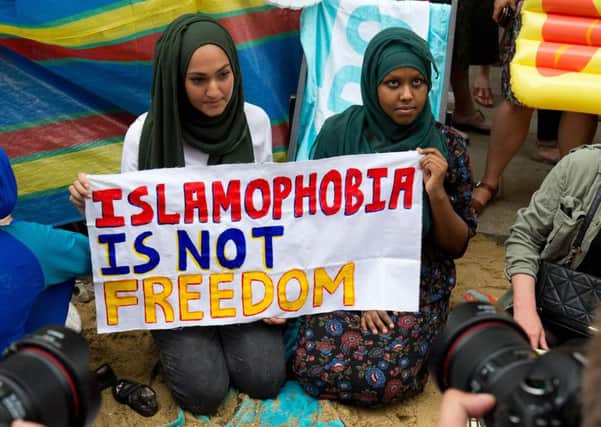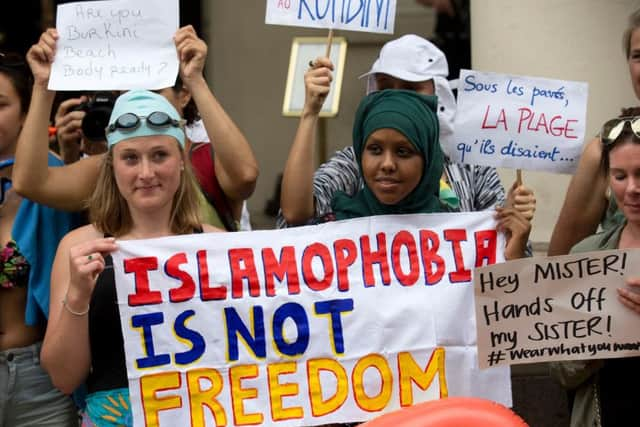Paris Gourtsoyannis: Isolation isn't the answer to division


It isn’t hard to see why Theresa May’s announcement of an ‘equality audit’ at the weekend has been greeted with some scepticism.
The rhetoric sounds unfamiliar being spoken by a Conservative Prime Minister, even one who pledged on the steps of Downing Street to root out the “burning injustices” of race discrimination and poor educational attainment among the white working class.
Advertisement
Hide AdAdvertisement
Hide AdAnnounced in the dead of August, with most people on holiday and the Labour Party absent for reasons of its own, the measure doesn’t on its own represent a ground-breaking push for equality.


But it at least reinforces the principle that the role of the state is to foster greater inclusion, whether in response to racial division, lack of economic opportunity, or the isolation of Muslim communities being preyed upon by individuals seeking to radicalise their young people.
We already know that inequality exists, but having the evidence to define and pinpoint the problem can help to galvanise a response.
In the wake of the 2011 riots, research into the use of stop and search tactics by police confirmed that more than a decade after the judicial inquiry into the Steven Lawrence murder, young black men remained seven times as likely to be stopped than their white peers.
Shocked by evidence figures showing less than one in ten of those stops resulted in an arrest, Home Secretary May demanded restrictions on the use of the tactic.


Similarly, at the start of the last decade, the appalling outcomes at inner city schools in the capital prompted the London Challenge, a initiative so successful that aspects of it are now being mimicked in the reform-resistant Scotland.
The areas that benefited most, like Tower Hamlets, were those with large minority communities. A response on that scale is now needed for white boys in the depressed coastal towns of England, where a toxic mix of poor schools and a lack of jobs have seen areas left behind. It isn’t a coincidence that those same areas voted heavily for Brexit.
May’s announcement is heartening because it insists that everyone is entitled to play an equal part in society, regardless of their background, and it is the role of the state to allow that to take place.
Advertisement
Hide AdAdvertisement
Hide AdIf that sounds like a straightforward and uncontroversial principle, then look across the Channel. Images from France last week of three armed police surrounding a woman on a beach forcing her to undress seem like something out of a surreal comedy. It’s the kind of bizarre and unsettling dystopian scene that you might see in a Banksy mural.
As an advert for liberal democracy, those images fail so catastrophically that they could easily be used as recruiting posters for its opponents. The fight against radicalisation is deadly serious, and the idea a so-called ‘burkini ban’ does anything to advance that cause is laughable.
Thankfully, a higher court has struck down the local regulations imposed by one Riviera town, putting the mayors of Nice, Cannes and other municipalities with similar rules on notice.
But they have the backing of the once-and-would-be French president, Nicolas Sarkozy, who has said he wants to roll out the ban across France.
David Frum, the Canadian conservative commentator and former speechwriter for George W Bush, summed up the thinking of the ban’s supporters succinctly last week. “The people promoting the burkini do not think: ‘It’s just a personal preference! We’ll happily share public space with bikini-clad women’,” he posted on Twitter. “They are asserting a norm they would enforce on ALL women, if they had the power to do so.”
But that is exactly what Siam, the woman on the beach in Nice, was attempting to do. For her attempt at coexistence, she was publicly humiliated and fined.
It requires a potent suspension of logic to believe that a woman’s individual freedom is promoted by empowering a group of men - with guns - to tell her what to wear. Ironically, for such obvious xenophobic paternalism to successfully masquerade as feminism, it has to be pretty well covered up.
To believe measures like the burkini ban are necessary, you also have to see everyday encounters between people of different backgrounds as battles in an unwinnable cold war between religions and cultures.
Advertisement
Hide AdAdvertisement
Hide AdIt demands ordinary people should feel alienated and afraid walking down the street in south London or south Glasgow. Speaking for myself, I’m not prepared to live with that perpetual duck-and-cover mentality, and I can’t imagine it’s pleasant for people who do. If western liberalism is threatened by what a woman wears, it wasn’t liberalism to begin with.
Thankfully, authorities in the UK take a different approach, and last week Police Scotland confirmed it would join forces in England who have introduced a headscarf as part of its uniform, if female Muslim officers wish to wear one.
It’s a welcome symbol of the force’s willingness to include rather than exclude the community it polices. There are unlikely to be many takers at first, however - the number of Police Scotland officers from minority backgrounds is about a fifth of the proportion in the wider population.
Being part of the community is a valuable intelligence tool, and it’s a useful reminder that there are far more important issues affecting community cohesion that what a few people wear. And the fact that one of the more serious candidates for the Ukip leadership, Lisa Duffy, believes Muslim women wearing veils shouldn’t be allowed to ride the bus or go shopping shows there are plenty of people in the UK who believe individual freedom is achieved by coercion rather than example.
The watchword of Islamic fundamentalists is that there can be no “grey zone” between cultures. Surely we should focus on proving them wrong, not proving them right.